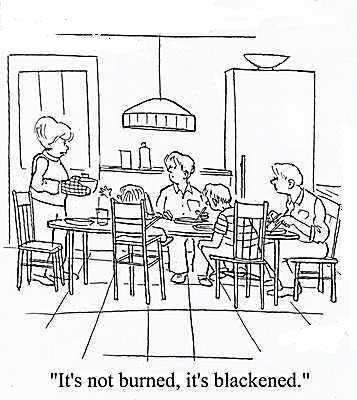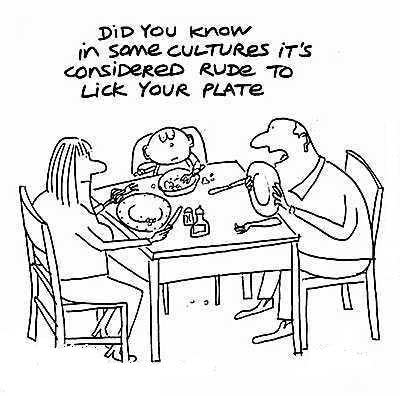晚飯時(shí)間,家里的餐桌上卻冷冷清清,擺滿了垃圾食品。家人還未到齊,已開吃的人則一言不發(fā),狼吞虎咽……過去可不是這樣!該做出改變了。

By Christine Biggs
高雯雯 選注
It’s suppertime in my house, but it resembles nothing like the Leave it to Beaver-style dinners I grew up with.[1] My husband isn’t home from work yet, my 13-year-old son is still at his friend’s house, and my 15-year-old daughter is glued to Facebook.[2]
I serve up[3] four plates of food anyway. The frozen fish sticks are cooked yet soggy.[4] The fries are limp[5] but edible. The canned corn is mushy, and the bagged salad, which expired two days ago, is looking tired despite an injection of cucumber slices and baby tomatoes.[6]
No wonder my family has failed to be prompt[7]. But Sarah’s tutor is scheduled to arrive in half an hour, at which time the rattling in the kitchen must cease, offering peace and quiet to the studious pair.[8]
When my husband and son finally roll in one after the other, Sarah and I have eaten, she’s back at the screen, and I’m scraping plates while digesting disappointment over our family-meal fiasco: crappy food, late arrivals and no conversations.[9] Discouragement set aside, I microwave two cold dinners and shove them in front of the latecomers.[10] Miraculously, by the time the tutor arrives, the boys have inhaled dinner, the dishwasher is loaded and the kitchen is clean.[11]
I grew up in a bungalow[12] in the sixties with my parents and older brother. Mom and Dad had expectations for Peter and me during family dinners, like arriving on time, assisting with setting and clearing the table and cleaning up, minding our manners and partaking in[13] family discussions.
I miss those days when suppertime brought our busy lives together. I miss the wobbly[14] glass kitchen table with hard plastic chairs that welcomed us every night. I miss Mom’s home-cooked cuisine, the home-baked desserts and the discussions that transpired.[15] I even miss Miss Manners, who was channelled by Mom and Dad at every meal.[16]
We far from resembled a perfect family. When my brother entered his teens, he introduced us to fast-food eating—the kind where you sit sideways in your chair while shovelling mounds of food into your mouth, hoping you could whip through dinner during one commercial break.[17] We’d laugh at the belches that escaped, moan at the sight of liver and onions,[18] and question why my parents didn’t have to drink milk.
Looking back on it now, even though there were hiccups, our meals together dished up a healthy serving of bonding that strengthened our family.[19] But those days are long past, and as much as I have wanted to recreate that mealtime connection in my own home, it’s just not working.
Our kitchen is small, housing only a bar-type platform that acts as our table, protruding diagonally outward and leaving little room to manoeuvre.[20] Surrounding this makeshift[21] table are four stools. When we eat together, we crowd around this excuse for a table, which also doubles as a countertop for serving food and stockpiling dirty dishes.[22] To avoid bodily injury, I’ve claimed sole proprietorship of all aspects of meal-making—cooking, serving and cleaning up—even at the risk of jeopardizing my kids’ culinary education.[23]

Although we try to eat healthily, fast food, free delivery and frozen dinners are a mainstay—zero prep time, minimal cleanup and often served cafeteria-style as we rotate through the kitchen.[24] With Andrew’s hockey commitments,[25] Sarah’s evening activities and my husband’s work schedule, planning a family dinner is like trying to make a meal that everyone likes: impossible.
It wasn’t until recently, when we celebrated a family birthday with my parents at a fancy restaurant, that the raw truth hit me.[26] Thanks to my Dad. He pointed out things about my kids that I had conveniently ignored all these years, like the fisted grip Andrew uses to hold his fork, the elbows that comfortably rest on the table, and the napkins that can’t seem to find their proper place.[27] Surprisingly, Dad refrained from commenting when the cellphones appeared for some friendly texting between siblings.[28] Perhaps the dirty look Mom gave him curbed his appetite for constructive criticism.[29]
I was reminded of the chant I learned long ago at summer camp: “Elbows, elbows off the table, this is not a horse’s stable, but a first-class dining table.”[30] I’d let our kitchen become a horse’s stable and it was time for a change. It was time to bring back family dinners, like in the good old days.
Gradual exposure to a new routine was paramount so that it wouldn’t backfire, especially with my younger diners.[31] I began by clearing the papers and dusting off the dining-room table so we could eat there. I decided to retain kitchen duties to avoid culture shock,[32] and didn’t tell anyone about the change of scenery until it was time to eat.
Our first dinner in the dining room was surprisingly pleasant. Everybody showed up on time, we ate a home-cooked meal and talked to each other. Andrew still gripped his fork, I forgot to put out napkins and I ignored the elbows on the table. But it was a start.
Now, more than two months later, we’re still eating in the dining room. Andrew is working on his fork grip, the kids are now clearing the table, and our discussions revolve around world events and school-day revelations[33]. We still have kinks[34] to work out, but I’d say progress has been made in transforming our horse’s stable into a proper family dining table.
Vocabulary
1. resemble: 像,類似于;Leave it to Beaver: 《反斗小寶貝》,美國20世紀(jì)50年代熱播的電視劇,反映的是美國一個(gè)傳統(tǒng)家庭的生活狀況,比如晚飯時(shí)分,母親在家準(zhǔn)備好晚飯,父親下班回到家中,一家人幸福地圍坐在餐桌旁吃著香噴噴的飯菜。
2. be glued to: 聚精會(huì)神地盯著某物;Facebook: 美國著名社交網(wǎng)站。
3. serve up: 端上桌,上菜。
4. fish stick: (涂有面包屑的)魚條;soggy: 未烤透的。
5. limp: 松軟的。
6. 罐裝玉米呈爛糊狀,還有一盤兩天前就已過期的袋裝色拉,盡管加入了黃瓜片和小西紅柿,看上去還是不太新鮮。
7. prompt: 準(zhǔn)時(shí)到達(dá)的,按時(shí)回家的。
8. rattling: 喀啦聲;cease: 停止;studious: 用功的,好學(xué)的。
9. scrape: 擦;fiasco: 徹底失敗;crappy: 無價(jià)值的,很差的。
10. microwave: v. 用微波爐熱;shove: 亂推。
11. miraculously: 奇跡般地;inhale: 狼吞虎咽地吃掉;load: 裝載(以便運(yùn)行)。
12. bungalow: 單層小屋。
13. partake in: 參加。
14. wobbly: 不穩(wěn)的,晃晃悠悠的。
15. cuisine: 菜肴;dessert: (餐后)甜點(diǎn);transpire: 發(fā)生。
16. Miss Manners: 禮貌小姐朱迪絲?馬丁(Judith Martin),從小跟在聯(lián)合國工作的父親走南闖北,大學(xué)念的是衛(wèi)斯理女子學(xué)院(Wellesley College),是擁有良好教養(yǎng)的淑女。1982年,身為《華盛頓郵報(bào)》記者的她開始在該報(bào)開設(shè)一個(gè)名為“Miss Manners”(禮貌小姐)的專欄,旨在給那些對(duì)禮貌禮儀感到困惑的人指點(diǎn)迷津;channel: 集中,關(guān)注。
17. sideways: 斜向一側(cè)的;shovel: 大口大口吃;mounds of: 一大堆;whip through: 迅速吃完;commercial break: 廣告時(shí)間。
18. belch: 打嗝;moan: 哀嘆。
19. 如今回憶起那段日子,縱然打嗝聲此起彼伏,但我們共進(jìn)晚餐,就好比享用一頓強(qiáng)化家人關(guān)系的健康大餐。
20. protrude: 伸出,突出;diagonally: 斜地,對(duì)角地;manoeuvre: 活動(dòng),操作。
21. makeshift: 權(quán)宜的,臨時(shí)的。
22. crowd: 催逼;countertop: (廚房的)工作臺(tái)面;stockpile: 堆放。
23. proprietorship: 所有權(quán);jeopardize: 危及,損害;culinary: 烹飪的,廚房的。
24. mainstay: 主要依靠;prep: = preparation,準(zhǔn)備;cafeteria: 自助餐廳。
25. hockey: 曲棍球;commitment: 參與,投入。
26. fancy: 高檔的,精致的;raw truth: 赤裸裸的事實(shí)。
27. conveniently: 順便地;fisted grip: 手握成拳頭抓住;napkin: 餐巾。
28. refrain: 克制,抑制;text: v. 發(fā)短信;siblings: 兄弟,姐妹。
29. give sb. a dirty look: 惡狠狠地瞪某人一眼;curb: 克制,抑制。
30. chant: (尤指眾人齊喊或合唱的)反復(fù)而有節(jié)奏的短句;stable: 馬廄。
31. routine: 慣例;paramount: 首要的,主要的;backfire: 產(chǎn)生事與愿違的后果。
32. retain: 保持,保留;culture shock: 文化沖擊,此處指我暫時(shí)繼續(xù)承擔(dān)廚房里所有的活兒以免家里其他人覺得不習(xí)慣和震驚。
33. revelation: 出人意料的真相透露,驚人的發(fā)現(xiàn)。
34. kink: 問題,困難。
(來源:英語學(xué)習(xí)雜志)
